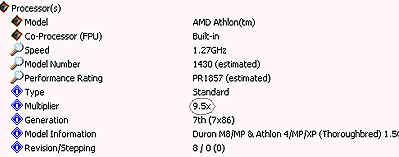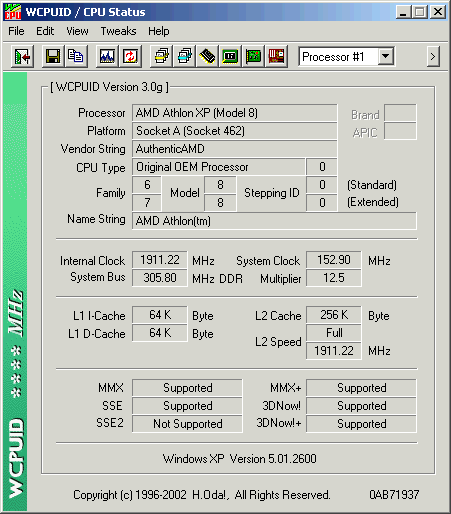Temperatures:
We were very surprised to see such high temperature readings from the T-Bred
CPU's.
With a Thermalright SK-6 heatsinks and a 40CFM 60mm YS
Tech fan the Athlon XP2100+ was hitting 52 degrees celsius at stock speeds, and the Athlon XP2000+ just
above 51 degrees. This is due to the smaller sized core. Because the core is
smaller, there is less contact between the die and the heatsink so thermal
transfer is decreased greatly.

AthlonXP
2000+

AthlonXP
2100+
As for the core technology, the new Athlon XP T-Bred is basically a
shrunken down version of the Palomino - the cores are basically the same, the
process used to make them is just more advanced. The T-Bred has SSE technology,
hardware prefetch and PowerNow! technology.
If
you'd like to learn more about the T-Bred/Palomino technology, please read this article on
PCstats.
Overclocking:
Ahh, overclocking. History has shown us that smaller cores usually mean better overclocking.
Just look at the Pentium III Katmai VS the Pentium III Coppermine, or the P4
Williamette VS the P4 Northwood. Our overclocking attempts with the two AthlonXP T-Bred
processors were very weird to say the least.
The AthlonXP2100+ was multiplier locked by default and the highest FSB we could reach was 136 MHz FSB with a voltage
of 1.75V! 1768 MHz was the highest speed we could get, a very minor 35
MHz above stock speeds! Temperature readings at that speed were hitting 65 degrees celsius! The
Athlon XP2000+ though was a different story though.
By
default the Athlon XP2000+ was multiplier
unlocked
and we could use any
multiplier from 6x-12.5x. The XP2000+ turned out to be a better overclocker then the
XP2100+, hitting a top speed of (12.5 x 152 MHz) 1.9 GHz at a voltage of 1.75V.
Temperatures were hitting 65-70 degrees celsius, but the system was 100% stable
during testing.
I'm not sure if
retail T-Bred CPU's will be unlocked by default but I wouldn't be betting on
it.

Multiplier on
XP2000+ was adjustable on the 8K3A+

Both AthlonXP T-Bred processors were based on the AIRCA stepping and
from the evidence online here and here
that
stepping doesn't overclock well in general. AMDMB.com was able to hit
an amazing 2.1
GHz+
with their XP2200+ but both of their XP2100+'s overclocked only a small
amount.


